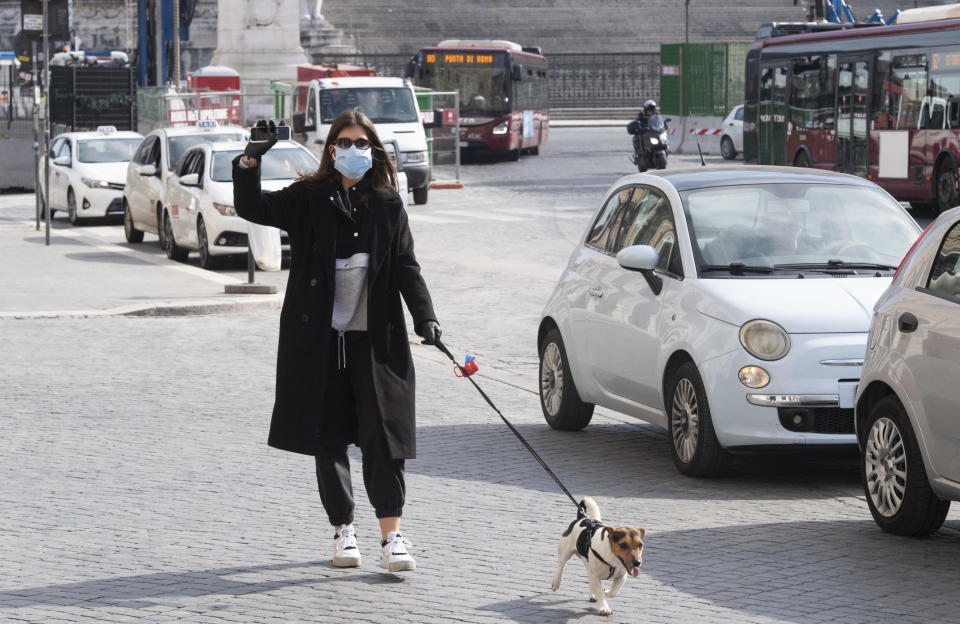Can dogs get coronavirus?
With coronavirus spreading across the globe some people might be concerned about whether their pets can contract COVID-19.
Yahoo News Australia has spoken with expert veterinarians to determine whether your cat or dog can contract the virus.
And whether they can give it to you.
Can dogs get coronavirus?
Dr Kevin Cruickshank, of Gold Coast Vet Surgery, told Yahoo News Australia the type of coronavirus infecting humans, also known at COVID-19, and the one which can affect dogs are “completely different diseases”.
Coronavirus live blog: Latest news and updates about the crisis in Australia
Dr Leigh Davidson, from Your Vet Online, added “currently there is no evidence” dogs can become infected with COVID-19.
Earlier this month, 14 greyhounds in Victoria were quarantined for a fortnight with canine coronavirus.

But the governing body Greyhound Racing Victoria said the outbreak was not connected to the ongoing COVID-19 health emergency and the virus cannot be transferred between dogs and humans.
Dr Davidson said coronavirus was a name given to a “large number of viruses” that may cause illnesses in humans and animals.
“It’s important to differentiate what coronavirus we are talking about as not all of them are infectious to humans,” she said.
“The novel coronavirus has been given the scientific name SARS-CoV-2 and known as COVID-19.
“The spread of COVID-19 is a result of human-to-human transmission and we have no evidence that companion animals can spread the disease.”
Can cats get coronavirus?
Similar to dogs, cats can’t get COVID-19.
The World Health Organisation said, among its 11 myths it busted about coronavirus, that there is “no evidence that companion animals” can get the virus.
That being said it’s still important to practice good hygiene around your cat and to wash them when needed.
Should I put a mask on my pet?
You can, but there probably is no need to. And let’s face it, a German Shepherd probably isn’t going to enjoy it much.
“It’s impractical and there’s no real point in doing it,” Dr Cruickshank said.
“They don’t like masks on their faces, there’s no benefit and it’s basically impossible to put a mask on a cat or a dog.”

Can people catch coronavirus from their pets?
Dr Cruickshank said people can’t catch the virus from their furry friends.
“There’s no suspicion of that,” he said.
However he added while the virus can’t be transmitted from an animal to a human it is a bit like a “parcel to parcel”.
“There wouldn’t be transmission but there can be droplets,” he said.

“If someone pats a dog and they have the virus it could be transmitted.”
To explain this, the dog in Hong Kong is said to have carried the virus, meaning it was present on the animal without infecting it or making the pooch sick.
Coronavirus particles could stay alive on a pet’s fur
The particles which spread the virus could be present on its fur – similar to the virus being on the surface of a door knob, a desk or a smartphone.
Those objects aren’t infected as such, they just have the virus on their surfaces.
Dr Cruickshank explained after a clean and a short time these particles are gone.

This week RSCPA Australia made a note to remind the public that “to date, there is no evidence that companion animals play a role in the spread of this human disease or that they become sick if they are exposed to the virus.”
However, there is a risk that if you are infected with the virus, it may be present on your pet’s fur or skin and could be picked up by another person.
“So you need to make sure anyone who comes in to contact with your pets practices good hygiene,” RSPCA Australia warned.
Viruses are ‘species specific’
He also said viruses held by animals have to mutate to make humans ill.
“Viruses are species specific,” he said.
The vet added his message was “one of calm”.
“There’s no need for extra concern about transmission from pets or about them getting sick,” he said.
“If we think about it, there are thousands the world over with the virus.
“We’d know about strange transmissions from pets if they had occurred.”
with AFP and AAP
Do you have a story tip? Email: newsroomau@yahoonews.com.
You can also follow us on Facebook, Instagram and Twitter and download the Yahoo News app from the App Store or Google Play.





